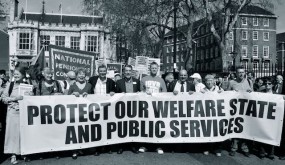
The hidden costs of welfare reform
“However, for most participants – regardless of age, qualification level and gender – welfare-to-work appears to increase anxiety. This is a potent reminder that the costs of welfare reform cannot – and should not – be measured in economic terms.” Daniel Sage argues for a broader definition when considering the impact of welfare to work policies.

The path to the precipice
“We are blithely rushing along a path towards a fundamental change in our welfare system that will have far-reaching social and fiscal consequences. There is a perfect storm of a poorly contracted Work Programme, political rhetoric, and short-term accounting practice.” Richard Johnson looks at the debate on the next round of welfare reform.

Long term unemployment: four people in their own words. And why the word “vulnerable” needs to go
“One of the reasons I’m posting these transcripts is that in the last week especially, we’ve not heard enough from people who’ve actually experienced long-term unemployment.” Kate Belgrave shares four stories from people who have been unemployed for several years.

Why it won’t work
“Any organisation thinking of bidding for probation work ought to be fully aware that despite all the rhetoric and spin, every Government policy from now till the next General Election will be designed to make the task of Transforming Rehabilitation as difficult as possible…” Jim Brown explains why the probation reforms won’t work.

Will George Osborne’s Work Programme Type 2 work better than the Work Programme Type 1?
“This begs the question: what is the purpose of the Work Programme? Why are providers not already addressing issues such as drug addiction and illiteracy? In the view of current providers, are they not viable clients under the payment by results regime?” Andy Winter questions what the ‘new Work Programme’ says about the existing one.

The poisonous politics of reducing unemployment
“The easier political answer to the unemployment issues is to pull the fiscal and legislative levers. …And job done. Only it isn’t.” Writing in advance of George Osborne’s speech to the Conservative Party conference, Puffles laments that politicians are avoiding answering the difficult questions about unemployment.

Shouldn’t “Policy Exchange” be honest? “Propaganda Exchange” is more accurate
“I’m SICK of half truths and misleading sentences. Sick of cherry picked data that uses random figures to paint false pictures. Sick of assumptions about the labour market and fraud that just aren’t true.” Sue Marsh takes aim at a new report from Policy Exchange.

Chris Huhne, rehabilitated. Too bad for everyone else.
“The appearance of Chris Huhne’s weekly column is now a serious irritation. He is a crook, a liar and a cheat. His greatest talent is blaming others for all of that.” Kate Belgrave shares a few thoughts on the return of Chris Huhne and a few people she has met who’d love to be welcomed into genteel society as well, but never will be.

Councils using zero hours, casual staff and the work programme
“This post lists the results of an FOI I recently sent to councils to get a rough idea of how many people councils employed on zero hours contracts or zero hours-type working arrangements and how many councils were using the work programme.” Kate Belgrave investigates the increasing use of zero-hours and casual work contracts in local authorities.

Does welfare-to-work boost well-being?
“Improving well-being through welfare-to-work is not straightforward. To make stronger and more widespread gains, it is likely that the government will have to try a much different approach.” Daniel Sage considers whether welfare to work programmes improve the well-being of unemployed people.

Hoban meeting update
“So, yesterday, as most of you will know by now, representatives from Spartacus finally got to meet with Mark Hoban to discuss Employment and Support Allowance and Work Capability Assessments after almost a year of trying.” Sue Marsh provides an update on Spartacus’ meeting with Work and Pensions Minister Mark Hoban.

The Government considers itself to be above the law
“…they have not stopped, they have not listened and they have not been reasonable. Ever felt like your Government is really out to get you?” kittysjones explains how the Government is refusing to respond to legal rulings challenging its welfare reforms.

Despite all the propaganda, Britain remains liberal and collectivist
“One lesson for Labour might be that it needs to be more bold and speak above the heads of the media and more directly to people, to enable it to connect with the more liberal and collectivist attitudes that, despite all the propaganda, still dominate amongst the public.” Steve Hilditch argues that Britain remains a liberal and collectivist society.

A responsible approach?
“…when it suits them, this government (perhaps all politicians) are more than happy to characterise something that was making (slower than expected) progress as an ‘exhausted’ approach that failed and actually made things worse.” Stephen Crossley challenges the Coalition’s portrayal of their child poverty strategy.

It’s fraud, Lord Freud.
“You have got to admire the consistency – the last 27 words contain four statistics and four of them are wrong. When speaking about disability benefits Government ministers have consistently abused numbers to make their case – but four inaccuracies within 27 words is surely a record.” Paul Morrison challenges yet more inaccuracies from Lord Freud.

Trying to work but living below subsistence level
“What a shame it is that the welfare system is not designed to facilitate those people who want to work, even if only part time, but instead makes it impossible for them to work.” The Masked AMHP tells the story of a couple who typify the unintended consequences of recent welfare changes.

Dear Esther McVey MP
“…“around 50 per cent of decisions are made on the basis of the claim form alone” - the contrary evidence for this is overwhelming but most tellingly on the DWP’s own site…” Jayne Linney has some questions - as yet still unanswered - for the minister for disabled people Esther McVey.

‘Benefits Britain’, a study in enabling hate speech
“Ultimately it is clear that Benefits Britain served to enable an orgy of hate speech against disabled people, and it is difficult to conclude that this was unintended.” David Gillon is concerned that Channel 4’s portrayal of disabled people has legitimatised disablist views.

Channel 4′s Benefit Britain and the expansion of the Welfare State after 1948
“Moreover, thanks to the Coalition, poverty in Britain is actually increasing. What we need are fewer programmes purporting to show how generous modern welfare provision, and more that show how the Coalition’s policies and cuts are actually making it more widespread.” Beastrabban takes aim at Channel 4′s much-criticised Benefits Britain programme.

Do people really ‘get used to a life on benefits’?
“The cornerstone of the Coalition’s welfare reform agenda is the idea of ‘welfare dependency’…But how valid this is this assumption? Do people get used to a life on benefits?” Daniel Sage puts the Government’s welfare reforms to the test.